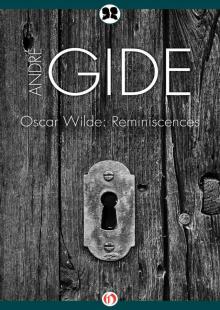- Home
- André Gide
The Counterfeiters Page 7
The Counterfeiters Read online
Page 7
Not that he detests Passavant. He has met him occasionally and has thought him charming. Passavant, moreover, has always been particularly amiable to him. But he dislikes Passavant’s books. He thinks Passavant not so much an artist as a juggler. Enough of Passavant!
Edouard takes Laura’s letter out of his coat pocket—the letter he was reading on the boat; he reads it again:
“Dear friend,
The last time I saw you—(do you remember?—it was in St. James’s Park, on the 2nd of April, the day before I left for the South?) you made me promise to write to you if ever I was in any difficulty. I am keeping my promise. To whom can I appeal but you? I cannot ask for help from those to whom I should most like to turn; it is just from them that I must hide my trouble. Dear friend, I am in very great trouble. Some day perhaps, I will tell you the story of my life after I parted from Felix. He took me out to Pau and then he had to return to Cambridge for his lectures. What came over me, when I was left out there all by myself—the spring—my convalescence—my solitude?… Dare I confess to you what it is impossible to tell Felix? The time has come when I ought to go back to him—but oh! I am no longer worthy to. The letters which I have been writing to him for some time past have been lying letters, and the ones he writes to me speak of nothing but his joy at hearing that I am better. I wish to heaven I had remained ill! I wish to heaven I had died out there!… My friend, the fact must be faced: I am expecting a child and it is not his. I left Felix more than three months ago; there’s no possibility of blinding him at any rate. I dare not go back to him. I cannot. I will not. He is too good. He would forgive me, no doubt, and I don’t deserve—I don’t want his forgiveness. I daren’t go back to my parents either. They think I am still at Pau. My father—if he knew, if he understood—is capable of cursing me. He would turn me away. And how could I face his virtue, his horror of evil, of lying, of everything that is impure? I am afraid too of grieving my mother and my sister. As for … but I will not accuse him; when he was in a position to help me, he promised to do so. Unfortunately, however, in order to be better able to help me, he took to gambling. He has lost the money which should have served to keep me until after my confinement. He has lost it all. I had thought at first of going away with him somewhere—anywhere; of living with him at any rate for a short time, for I didn’t mean to hamper him—to be a burden to him; I should have ended by finding some way of earning my living, but I can’t just yet. I can see that he is unhappy at having to abandon me and that it is the only thing that he can do. I don’t blame him—but all the same he is abandoning me. I am here in Paris without any money. I am living on credit in a little hotel, but it can’t go on much longer. I don’t know what is to become of me. To think that ways so sweet should lead only to such depths as these! I am writing to the address in London which you gave me. But when will this letter reach you? And I who longed so to have a child! I do nothing but cry all day long. Advise me. You are the only hope I have left. Help me if you can, and if you can’t … Oh! in other days I should have had more courage, but now it is not I alone who will die. If you don’t come—if you write that you can do nothing for me, I shall have no word or thought of reproach for you. In bidding you good-bye, I shall try and not regret life too much, but I think that you never quite understood that the friendship you gave me is still the best thing in my life—never quite understood that what I called my friendship for you went by another name in my heart.
LAURA DOUVIERS
P.S. Before putting this letter in the post I shall make another attempt. This evening I shall go and see him one last time more. If you get this therefore it will mean that really … Good-bye, good-bye! I don’t know what I am writing.
Edouard had received this letter on the morning of the day he had left England. That is to say he had decided to leave as soon as he received it. In any case he had not intended to stay much longer. I don’t mean to insinuate that he would have been incapable of returning to Paris specially to help Laura; I merely say that he is glad to return. He has been kept terribly short of pleasure lately in England; and the first thing he means to do when he gets to Paris is to go to a house of ill-fame; and as he doesn’t wish to take his private papers with him, he reaches his portmanteau down from the rack and opens it, so as to slip in Laura’s letter.
The place for this letter is not among coats and shirts; he pulls out from beneath the clothes a cloth-bound MS. book, half filled with his writing; turns to the very beginning of the book, looks up certain pages which were written last year and re-reads them; it is between these that Laura’s letter will find its proper place.
EDOUARD’S JOURNAL
Oct. 18th.—Laura does not seem to suspect her power; but I, who can unravel the secrets of my own heart, know well enough that up till now I have never written a line that has not been indirectly inspired by her. I feel her still a child beside me, and all the skill of my discourse is due only to my constant desire to instruct, to convince, to captivate her. I see nothing—I hear nothing without asking myself what she would think of it. I forsake my own emotion to feel only hers. And I think that if she were not there to give definition to my personality, it would vanish in the excessive vagueness of its contours. It is only round her that I concentrate and define myself. By what illusion have I hitherto believed that I was fashioning her to my likeness, when, on the contrary, I was bending myself to hers? And I never noticed it! Or rather—the influence of love, by a curious action of give and take, made us both reciprocally alter our natures. Involuntarily—unconsciously—each one of a pair of lovers fashions himself to meet the other’s requirements—endeavours by a continual effort to resemble that idol of himself which he beholds in the other’s heart.… Whoever really loves abandons all sincerity.
This was the way in which she deluded me. Her thought everywhere companioned mine. I admired her taste, her curiosity, her culture, and did not realize that it was her love for me which made her take so passionate an interest in everything that I cared for. For she never discovered anything herself. Each one of her admirations—I see it now—was merely a couch on which she could lay her thought alongside of mine; there was nothing in all this that responded to any profound need of her nature. “It was only for you that I adorned and decked myself,” she will say. Yes! But I could have wished that it had been only for her and that she had yielded in doing so to an intimate and personal necessity. But of all these things that she has added to herself for my sake, nothing will remain—not even a regret—not even a sense of something missing. A day comes when the true self, which time has slowly stripped of all its borrowed raiment, reappears, and then, if it was of these ornaments that the other was enamoured, he finds that he is pressing to his heart nothing but an empty dress—nothing but a memory—nothing but grief and despair.
Ah! with what virtues, with what perfections I had adorned her!
How vexing this question of sincerity is! Sincerity! When I say the word I think only of her. If it is myself that I consider, I cease to understand its meaning. I am never anything but what I think myself—and this varies so incessantly, that often, if I were not there to make them acquainted, my morning’s self would not recognize my evening’s. Nothing could be more different from me than myself. It is only sometimes when I am alone that the substratum emerges and that I attain a certain fundamental continuity; but at such times I feel that my life is slowing down, stopping, and that I am on the very verge of ceasing to exist. My heart beats only out of sympathy; I live only through others—by procuration, so to speak, and by espousals; and I never feel myself living so intensely as when I escape from myself to become no matter who.
This anti-egoistical force of decentralization is so great in me, that it disintegrates my sense of property—and, as a consequence, of responsibility. Such a being is not of the kind that one can marry. How can I make Laura understand this?
Oct. 26th.—The only existence that anything (including myself) has for me, is poetical—I restore this wor
d its full signification. It seems to me sometimes that I do not really exist, but that I merely imagine I exist. The thing that I have the greatest difficulty in believing in, is my own reality. I am constantly getting outside myself, and as I watch myself act I cannot understand how a person who acts is the same as the person who is watching him act, and who wonders in astonishment and doubt how he can be actor and watcher at the same moment.
Psychological analysis lost all interest for me from the moment that I became aware that men feel what they imagine they feel. From that to thinking that they imagine they feel what they feel was a very short step …! I see it clearly in the case of my love for Laura: between loving her and imagining I love her—between imagining I love her less and loving her less—what God could tell the difference? In the domain of feeling, what is real is indistinguishable from what is imaginary. And if it is sufficient to imagine one loves, in order to love, so it is sufficient to say to oneself that when one loves one imagines one loves, in order to love a little less and even in order to detach oneself a little from one’s love, or at any rate to detach some of the crystals from one’s love. But if one is able to say such a thing to oneself, must one not already love a little less?
It is by such reasoning as this that X. in my book tries to detach himself from Z.—and, still more, tries to detach her from himself.
Oct. 28th.—People are always talking of the sudden crystallization of love. Its slow decrystallization, which I never hear talked of, is a psychological phenomenon which interests me far more. I consider that it can be observed, after a longer or shorter period, in all love marriages. There will be no reason to fear this, indeed, in Laura’s case (and so much the better) if she marries Felix Douviers, as reason, and her family, and I myself advise her to do. Douviers is a thoroughly estimable professor, with many excellent points, and very capable in his own line (I hear that he is greatly appreciated by his pupils). In process of time and in the wear of daily life, Laura is sure to discover in him all the more virtues for having had fewer illusions to begin with; when she praises him, indeed, she seems to me really not to give him his due. Douviers is worth more than she thinks.
What an admirable subject for a novel—the progressive and reciprocal decrystallization of a husband and wife after fifteen or twenty years of married life. So long as he loves and desires to be loved, the lover cannot show himself as he really is, and moreover he does not see the beloved—but instead, an idol whom he decks out, a divinity whom he creates.
So I have warned Laura to be on her guard against both herself and me. I have tried to persuade her that our love could not bring either of us any lasting happiness. I hope I have more or less convinced her.
Edouard shrugs his shoulders, slips the letter in between the leaves of his journal, shuts it up and replaces it in his suit-case. He then takes a hundred-franc note out of his pocket-book and puts that too in his suit-case. This sum will be more than sufficient to last him till he can fetch his suit-case from the cloak-room, where he means to deposit it on his arrival. The tiresome thing is that it has got no key—or at any rate he has not got its key. He always loses the keys of his suit-cases. Pooh! The cloak-room attendants are too busy during the day-time and never alone. He will fetch it out at about four o’clock and then go to comfort and help Laura; he will try and persuade her to come out to dinner with him.
Edouard dozes; insensibly his thoughts take another direction. He wonders whether he would have guessed merely by reading Laura’s letter that her hair was black. He says to himself that novelists, by a too exact description of their characters, hinder the reader’s imagination rather than help it, and that they ought to allow each individual to picture their personages to himself according to his own fancy. He thinks of the novel which he is planning and which is to be like nothing else he has ever written. He is not sure that The Counterfeiters is a good title. He was wrong to have announced it beforehand. An absurd custom this of publishing the titles of books in advance, in order to whet the reader’s appetite! It whets nobody’s appetite and it ties one. He is not sure either that the subject is a very good one. He is continually thinking of it and has been thinking of it for a long time past; but he has not yet written a line of it. On the other hand, he puts down his notes and reflections in a little note-book. He takes this note-book out of his suit-case and a fountain pen out of his pocket. He writes:
I should like to strip the novel of every element that does not specifically belong to the novel. Just as photography in the past freed painting from its concern for a certain sort of accuracy, so the phonograph will eventually no doubt rid the novel of the kind of dialogue which is drawn from the life and which realists take so much pride in. Outward events, accidents, traumatisms, belong to the cinema. The novel should leave them to it. Even the description of the characters does not seem to me properly to belong to the genre. No; this does not seem to me the business of the pure novel (and in art, as in everything else, purity is the only thing I care about). No more than it is the business of the drama. And don’t let it be argued that the dramatist does not describe his characters because the spectator is intended to see them transposed alive on the stage; for how often on the stage an actor irritates and baffles us because he is so unlike the person our own imagination had figured better without him. The novelist does not as a rule rely sufficiently on the reader’s imagination.
What is the station that has just flashed past? Asnières. He puts the note-book back in his suit-case. But, decidedly, the thought of Passavant vexes him. He takes the note-book out again and adds:
The work of art, as far as Passavant is concerned, is not so much an end as a means. The artistic convictions which he displays are asserted with so much vehemence merely because they lack depth; no secret exigence of his temperament necessitates them; they are evoked by the passing hour; their mot d’ordre is opportunism.
The Horizontal Bar! The things that soonest appear out of date are those that at first strike us as most modern. Every concession, every affectation is the promise of a wrinkle. But it is by these means that Passavant pleases the young. He snaps his fingers at the future. It is the generation of to-day that he is speaking to—which is certainly better than speaking to that of yesterday. But as what he writes is addressed only to that younger generation, it is in danger of disappearing with it. He is perfectly aware of this and does not build his hopes on surviving. This is the reason that he defends himself so fiercely, and that, not only when he is attacked, but at the slightest restrictions of the critics. If he felt that his work was lasting he would leave it to defend itself and would not so continually seek to justify it. More than that, misunderstanding, injustice, would rejoice him. So much the more food for to-morrow’s critics to use their teeth upon!
He looks at his watch: 11:35. He ought to have arrived by now. Curious to know if by any impossible chance Olivier will be at the station to meet him? He hasn’t the slightest expectation of it. How can he even suppose that his post-card has come to Olivier’s notice—that post-card on which he informed Olivier’s parents of his return, and incidentally, carelessly, absent-mindedly to all appearance, mentioned the day and hour of his arrival … as one takes a pleasure in stalking—in setting a trap for fate itself.
The train is stopping. Quick! A porter! No! His suitcase is not very heavy, nor the cloak-room very far.… Even supposing he were there, would they recognize each other in all this crowd? They have seen so little of each other. If only he hasn’t grown out of recognition!… Ah! Great Heavens! Can that be he?
IX : Edouard and Olivier
We should have nothing to deplore of all that happened later if only Edouard’s and Olivier’s joy at meeting had been more demonstrative; but they both had a singular incapacity for gauging their credit in other people’s hearts and minds; this now paralysed them; so that each, believing his emotion to be unshared, absorbed in his own joy, and half ashamed at finding it so great, was completely preoccupied by trying to hide its intens
ity from the other.
It was for this reason that Olivier, far from helping Edouard’s joy by telling him with what eagerness he had come to meet him, thought fit to speak of some job or other which he had had to do in the neighbourhood that very morning, as if to excuse himself for having come. His conscience, scrupulous to excess, cunningly set about persuading him that he was perhaps in Edouard’s way. The lie was hardly out of his mouth when he blushed. Edouard surprised the blush, and as he had at first seized Olivier’s arm and passionately pressed it, he thought (scrupulous he, too) that it was this that had made him blush.
He had begun by saying:
“I tried to force myself to believe that you wouldn’t come, but in reality I was certain that you would.”
Then it came over him that Olivier thought these words presumptuous. When he heard him answer in an off-hand way: “I had a job to do in this very neighbourhood,” he dropped Olivier’s arm and his spirits fell from their heights. He would have liked to ask Olivier whether he had understood that the post-card which he had addressed to his parents, had been really intended for him; as he was on the point of putting the question, his heart failed him. Olivier, who was afraid of boring Edouard or of being misunderstood if he spoke of himself, kept silent. He looked at Edouard and was astonished at the trembling of his lip; then he dropped his eyes at once. Edouard was both longing for the look and afraid that Olivier would think him too old. He kept rolling a bit of paper nervously between his fingers. It was the ticket he had just been given at the cloak-room, but he did not think of that.
“If it was his cloak-room ticket,” thought Olivier, as he watched him crumple it up and throw it absent-mindedly away, “he wouldn’t throw it away like that.” And he glanced round for a second to see the wind carry it off along the pavement far behind them. If he had looked longer he might have seen a young man pick it up. It was Bernard, who had been following them ever since they had left the station.… In the mean while Olivier was in despair at finding nothing to say to Edouard, and the silence between them became intolerable.

 Oscar Wilde
Oscar Wilde The White Notebook
The White Notebook The Counterfeiters: A Novel
The Counterfeiters: A Novel Urien’s Voyage
Urien’s Voyage The Pastoral Symphony
The Pastoral Symphony The Counterfeiters
The Counterfeiters Urien's Voyage
Urien's Voyage